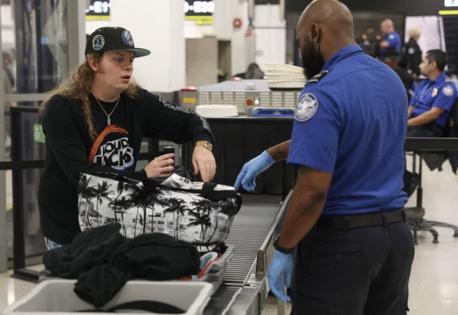Commentary: TSA isn't perfect, but it's way better than the alternatives
Published in Op Eds
Republican Sens. Mike Lee and Tommy Tuberville recently introduced the Abolish TSA Act of 2025, effectively calling for the privatization of airport security.
Against the backdrop of DOGE and the elimination of longstanding institutions like the Department of Education and the U.S. Postal Service, it appears that if ever there was a time to get rid of the Transportation Security Administration, this is it.
Doing away with the TSA does not mean doing away with airport security, of course. The TSA oversees a workforce of over 60,000 people who screen on average 2.5 million people every day at federalized airports to keep the air system safe. They are funded in part by the September 11th Security Fee. What makes such a task so daunting is that nearly every passenger that the TSA encounters is harmless. Only a few bad actors every year pose any risk to the air system. They are well camouflaged among the largely benign pool of air travelers.
Adding to the complexity is that air travelers are apt to openly criticize the TSA for its efforts to protect the air system, claiming it is more theater than substance. Yet if you asked these people how security operations could be improved, they can offer no better solutions to what the TSA offers, except perhaps less screening.
There is a nugget of truth to what they are saying. Over-screening is indeed ubiquitous. Yet there is more to airport security than intercepting 10-ounce bottles of shampoo and 6-ounce tubes of toothpaste at checkpoints. It is about maintaining a complex network of security layers, many of which are invisible to flyers, which collectively provide a nearly impenetrable shield designed to keep bad actors from compromising the air-travel system.
The TSA relies heavily on technologies, the most visible of which are full body scanners and detection of threats in carry-on bags. The challenge with such technologies is that they are slow, creating bottlenecks at airport security checkpoints, which are viewed as an inconvenience rather than enhanced security.
People, not threat items, pose the biggest risk to the air system. That is why research was needed to create a program like TSA PreCheck, which defined a new paradigm for improving air system security while reducing passenger inconvenience. The foundation for this program is risk-based security, which aligns passenger risk with security procedure requirements. In essence, the more that the TSA knows about travelers, the better security resources can be aligned with their risk. Since most travelers pose little risk to the air system, this translates into an expedited screening experience available via TSA PreCheck dedicated lanes.
The most recent advance in reducing security resources and screening for most travelers is the use of biometrics like facial recognition to authenticate passenger identity. Ensuring that all travelers are who they claim to be is critical to keeping bad actors from infiltrating the air system. The introduction of Credential Authenticate Technology with facial recognition, labeled CAT-2, is a quantum leap forward to separate the mostly benign travelers from the sprinkling of bad actors.
Several lawmakers believe that facial recognition is a violation of personal privacy and civil liberties. But if you look at the social media accounts of those who criticize facial recognition, you will find more personal privacy violations there than anything occurring at airport security checkpoints.
So why is facial recognition so important? For one, it offers a pathway to an expanded version of TSA Precheck, which will provide certain travelers the opportunity to pass through airport security checkpoints like airline crew members. Many travelers would be willing to pay for this privilege and undergo the necessary background screening to qualify for such convenience. Elected officials may also be eligible, including those who object to its use.
Facial recognition would also be an important enhancement for Screening at Speed, permitting flyers to be screened in real-time. Investments by the TSA in such a futuristic security screening model is the next quantum leap forward to improve security while minimizing passenger inconvenience.
Lee says that airlines should provide their own security. Such a hodge-podge of protocols would be far less secure than what the TSA currently provides. Privatizing airport security is an option, which the TSA already offers through its Screening Partnership Program. However, the TSA, not the private-sector companies, set security standards and performance benchmarks.
On any given day, at any given airport, the TSA may not execute its security tactics in the optimal manner. What it does get right are its security strategies, which work toward giving flyers what they want and deserve: a seamless process that protects them and the air system in the most nonintrusive way. That is why the TSA is needed today, and for the foreseeable future.
____
Sheldon H. Jacobson, Ph.D., is a professor in the Grainger College of Engineering at the University of Illinois Urbana-Champaign. He has researched risk-based aviation security for more than 25 years, providing the technical foundations for TSA PreCheck. This piece was originally published by The Hill.
___
©2025 Tribune Content Agency, LLC.




























































Comments